The dental pulp, made up of a mass of tissue containing blood vessels and nerves, plays a vital role in nourishing and maintaining the life of the tooth. Therefore, if the pulp is damaged or dies, it can lead to several serious oral health problems. The article below will clarify what a dead tooth pulp is and everything you need to know.
What is a dead tooth pulp?
What is a dead tooth pulp? A dead tooth pulp is the result of infection and damage to the dental pulp that, if left untreated, leads to pulp death. When the pulp decays, the patient usually no longer feels pain or discomfort in the affected tooth, making it difficult to detect and treat.
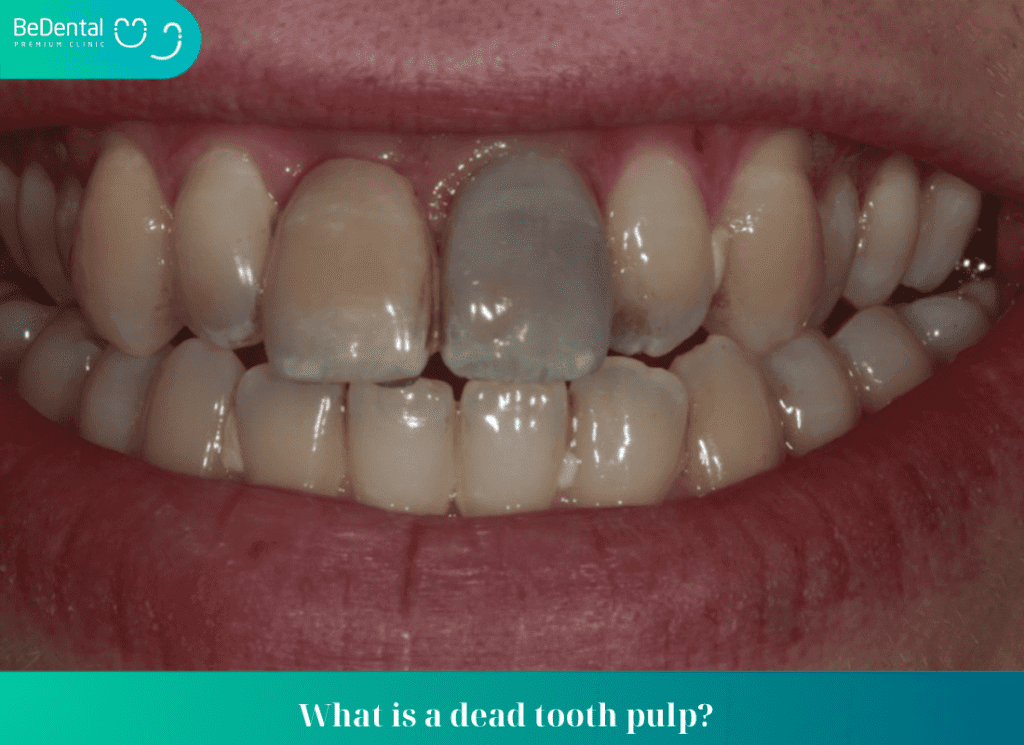
Signs of a Dead Tooth Pulp
What are some Signs of a Dead Tooth Pulp? The stages of pulp damage in a dead tooth can be identified by distinctive signs.
Reversible Pulpitis Stage
In the early stages of pulp damage, the patient may experience mild pain, especially at night. Additionally, when the tooth comes into contact with excessively hot or cold food, sensitivity or discomfort may occur.
See more: Does getting braces hurt?
Chronic Pulpitis Stage
During this stage, the pain becomes more persistent, especially in the early morning and at night. The tooth becomes highly sensitive, and any movement can cause pain.
Acute Pulpitis Stage
The pain intensifies and lasts longer, often persisting for hours. The gums may become irritated and swollen, leading to redness and soreness.
Necrotic Pulp Stage
At this stage, the pain no longer centers on the dead tooth but shifts to complications such as periapical inflammation, dental abscesses, and loose teeth, with the risk of the tooth falling out of the jaw
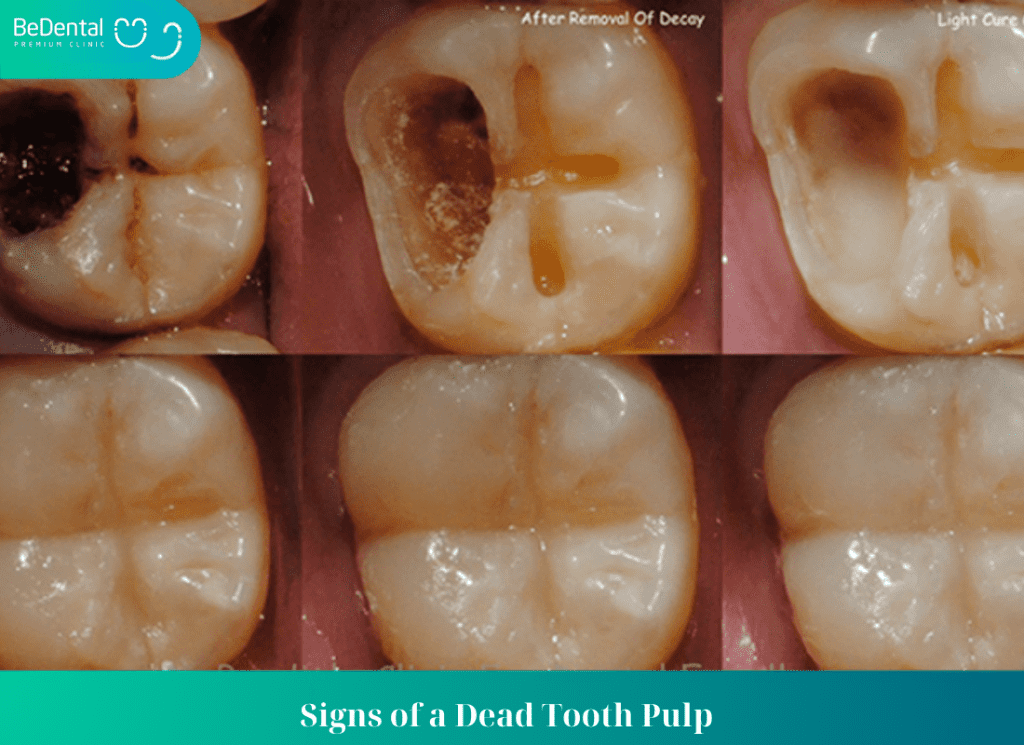
Causes of a Dead Tooth Pulp
Pulp Death Due to Tooth Decay
The primary cause of pulp death often stems from the progression of tooth decay. When a tooth decays, bacteria typically infiltrate through the enamel and dentin layers. Once these protective layers are compromised, bacteria can reach the pulp. Therefore, addressing cavities promptly with fillings is essential to prevent pulp damage.
Pulp Death Due to Cracked or Broken Teeth
When a tooth is damaged, the blood vessels and the supply of nutrients to the pulp are affected. Reduced or completely blocked nutrient supply to the pulp leads to its eventual death.
See more: Extracting teeth before getting braces
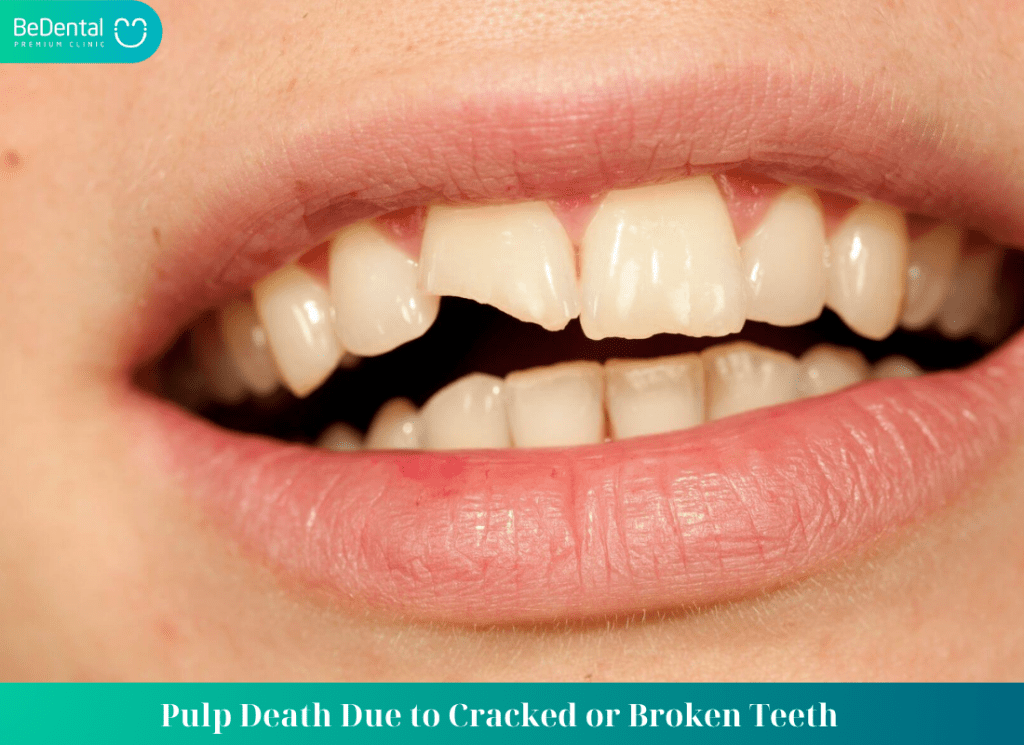
Pulp Death Due to Gum Disease
Another cause of pulp death is untreated gum disease, which can lead to gum infections, periodontitis, root inflammation, and abscesses. The gradual weakening of the tooth caused by these conditions eventually results in pulp death.
Treatment for a Dead Tooth Pulp
How is a dead tooth treated? The only method to address a dead tooth pulp is by removing the damaged pulp tissue and then reshaping and sealing the root canal. Root canal treatment generally involves five steps:
Examination and X-ray
The patient undergoes an exam and X-rays so the dentist can assess the extent of pulp inflammation, determine the length of the root canal, and develop a treatment plan.
Oral Cleaning and Anesthesia
The dentist will clean the mouth, removing bacteria and other infection-causing agents. Next, the patient receives local anesthesia to minimize pain and discomfort during the procedure.
Rubber Dam Placement
A rubber dam is placed around the tooth to prevent any chemicals used during treatment from entering the digestive system.
Pulp Treatment
The dentist creates an opening on the tooth surface to access the root canal and completely remove the dead pulp tissue. The root canal is then shaped and filled with specialized dental materials.
Root Canal Sealing
Depending on the patient’s oral health, the dentist will determine whether a filling or a cosmetic dental crown is the most suitable option for restoring the tooth.
See more: Why do children have bad breath
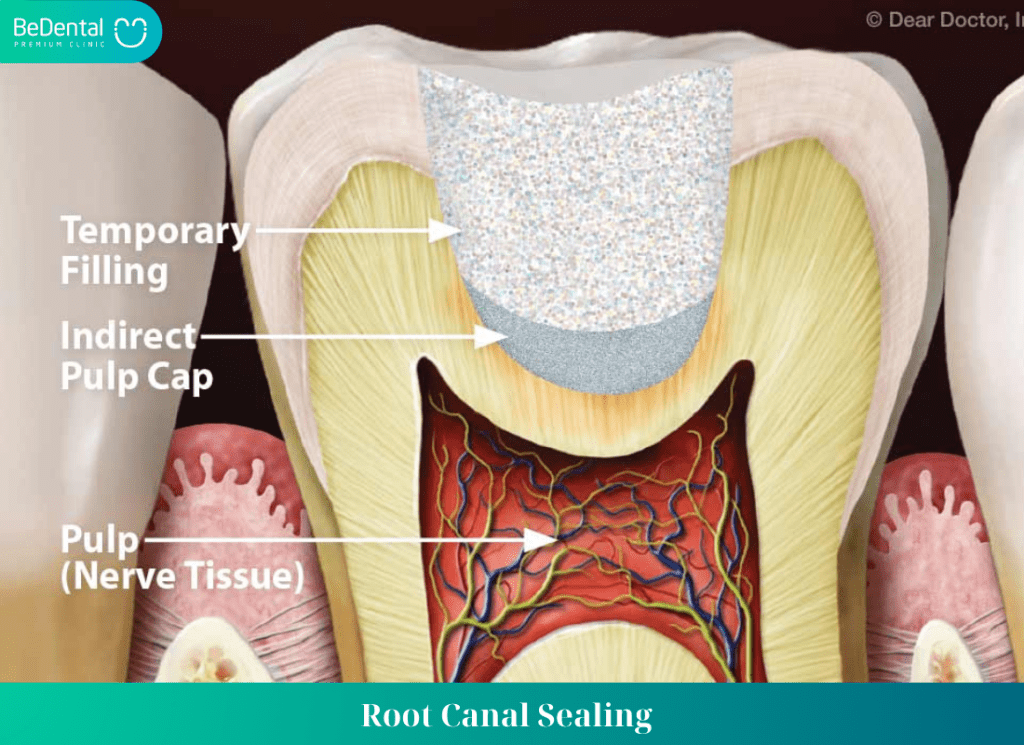
Should a Dead Tooth Pulp Be Extracted?
A dead tooth pulp should only be extracted if the original tooth can no longer function for chewing. If the dead pulp tooth is still salvageable, the dentist will try to find an appropriate treatment method.
If the dead pulp tooth has lost its function, the dentist will recommend removing it to protect the surrounding teeth. After extraction, quick implant placement is advised to prevent bone loss and facial deformation. Dental implants are the best solution to restore missing teeth, providing both aesthetic balance to the face and excellent restoration results.
Is a Dead Tooth Pulp Dangerous?
A dead tooth pulp not only makes eating difficult and negatively impacts quality of life, but it also carries various health risks. Bacteria from the infection can spread to surrounding tissues, leading to serious complications such as apical periodontitis, root abscesses, and even tooth loss. Other possible issues include root canal inflammation, bone infections, swollen lymph nodes, and more.
See more: The process of root canal treatment
Without timely treatment, a dead pulp tooth can lead to permanent tooth loss because the tooth cannot last long on the dental arch. In such cases, artificial dental restoration is required to replace the lost tooth. Prolonged tooth loss can result in jawbone deterioration, misaligned bite, and facial aging.
Therefore, if you notice any signs of a dead pulp tooth, it’s crucial to visit a reputable dental clinic immediately for examination and prompt treatment to avoid severe complications.
How Long Can a Dead Tooth Pulp Last?
The pulp lies deep beneath the enamel and dentin layers of a tooth. When the pulp becomes infected, it indicates that the entire tooth structure is compromised. In such cases, the tooth’s lifespan is typically about one year or even less.
Following pulp death, the hardening (sclerosis) of the tooth tissue occurs, making the tooth more susceptible to cracking and breaking under pressure. Sclerosis of the tooth tissue progresses quickly once it begins, and without timely intervention, there’s a high chance of permanent tooth loss.
Treatment Methods for a Dead Tooth Pulp
Root Canal Treatment
At-home remedies for pulp inflammation, commonly used by many people today, are not scientifically proven to be effective or safe for health. To ensure your health, when pulp issues are detected, you should visit a dental clinic for proper examination and treatment.
In the case of mild pulp death, dentists typically perform root canal treatment by removing all the dead pulp tissue using specialized dental instruments. Afterward, the pulp chamber is cleaned, and the root canal is sealed using specialized tools. Finally, the tooth will be restored with either a filling or a crown, depending on the specific case.
See more: What is teeth tightening during braces?
After root canal treatment, maintaining a proper diet and practicing good oral hygiene is essential. With proper care, your tooth can retain its chewing function for approximately 15 to 25 years.
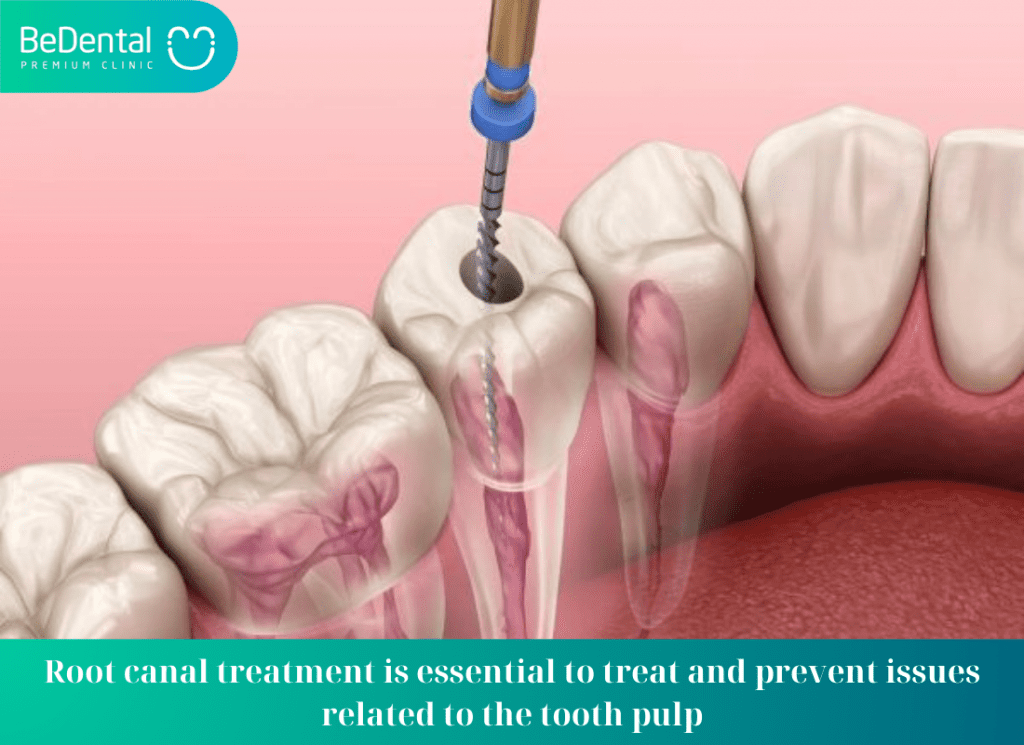
Tooth Extraction
Not all cases of dead tooth pulp require extraction. In dentistry, preserving natural teeth is considered extremely important. When you visit the dentist, they will examine your oral condition, and if it’s possible to save or restore the tooth through other methods, there is no need to extract the dead pulp tooth.
Typically, extracting a dead pulp tooth is considered a last resort when the tooth can no longer function for chewing. If the dead tooth pulp is no longer useful, the dentist may recommend extraction to protect the remaining teeth.
Additionally, when the tooth pulp is dead, it may come with other issues such as root infections or periodontitis, which can lead to abscesses. These complications can result in the tooth becoming unstable within the bone, causing it to loosen. In some cases, extraction is necessary to maintain the stability of the entire dental system.
Dental Implants
This method is closely related to the extraction of a dead pulp tooth. After extraction, dental implants are a popular method chosen by many, especially implant placement, which is highly regarded in many aspects and suitable for most patients.
Getting dental implants after tooth extraction is considered the best option due to its ability to minimize jawbone loss and provide several benefits such as:
- Enhancing the aesthetic value of teeth
- Ensuring proper chewing and speech function
- Maintaining harmony between teeth
- Long-lasting durability, even permanent with proper care
- No need for grinding or affecting other teeth
Dental implants after tooth extraction offer many advantages and are an effective solution for replacing missing teeth without impacting other teeth in the jaw.
Conclusion
This article has clarified everything you need to know about dead tooth pulp. Wishing you a smooth and successful treatment process!
See more: What is tooth filling?
Tư vấn chuyên môn bài viết:
BÁC SĨ DƯƠNG THỊ THÙY NGA


 Tiếng Việt
Tiếng Việt 한국어
한국어 日本語
日本語 中文 (中国)
中文 (中国)



